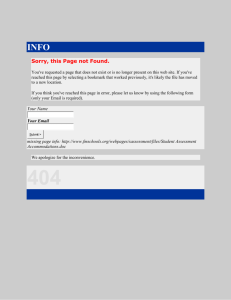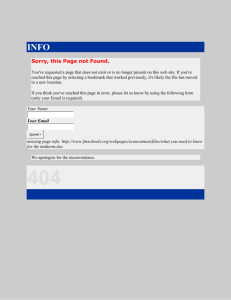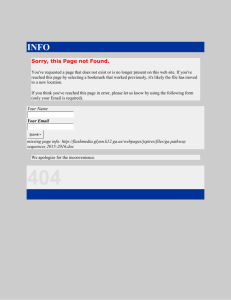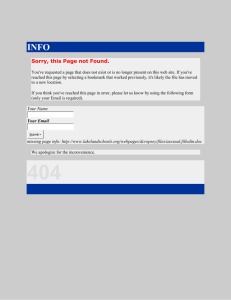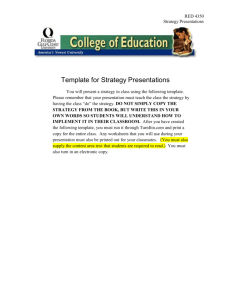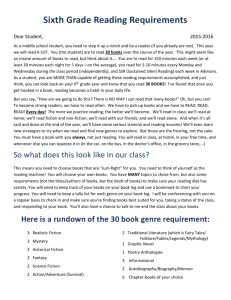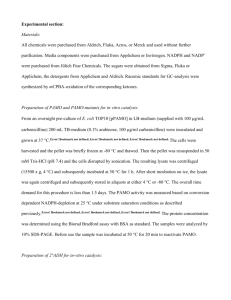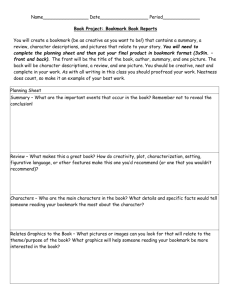standard for xml-message flow in the travel business
advertisement
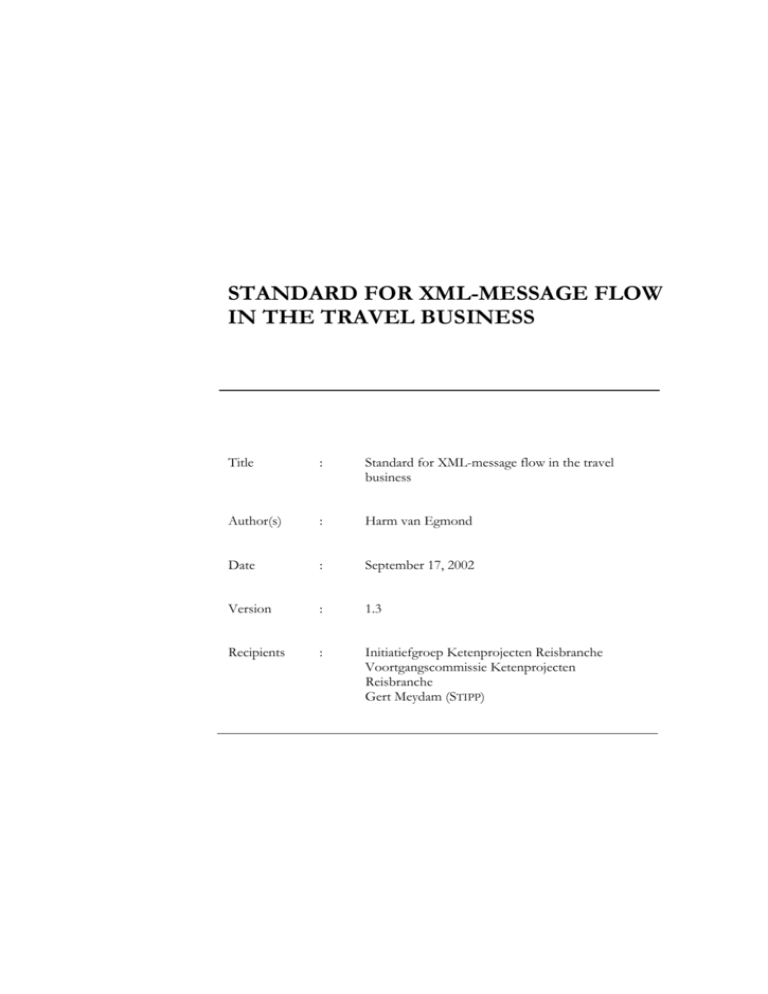
STANDARD FOR XML-MESSAGE FLOW IN THE TRAVEL BUSINESS Title : Standard for XML-message flow in the travel business Author(s) : Harm van Egmond Date : September 17, 2002 Version : 1.3 Recipients : Initiatiefgroep Ketenprojecten Reisbranche Voortgangscommissie Ketenprojecten Reisbranche Gert Meydam (STIPP) TABLE OF CONTENTS TABLE OF CONTENTS 1. INTRODUCTION ............................................................... Error! Bookmark not defined. 2. XML-MESSAGE FLOW ................................................... Error! Bookmark not defined. 3. 2.1 2.2 2.3 Premise ................................................................................. Error! Bookmark not defined. Flexibility .............................................................................. Error! Bookmark not defined. The standard’s scope .......................................................... Error! Bookmark not defined. EXPLANATION OF THE DIALOGUE ................. Error! Bookmark not defined. 3.1 Introduction ......................................................................... Error! Bookmark not defined. 3.2 Phases.................................................................................... Error! Bookmark not defined. 3.3 The dialogue ......................................................................... Error! Bookmark not defined. 3.4 Example ................................................................................ Error! Bookmark not defined. 3.5 Overview of the required elements depending on the dialogue.... Error! Bookmark not defined. 3.5.1 Availability phase ............................................................ Error! Bookmark not defined. 3.5.2 Selection phase ................................................................ Error! Bookmark not defined. 3.5.3 Assignment phase ........................................................... Error! Bookmark not defined. 3.5.4 Booking phase ................................................................. Error! Bookmark not defined. 3.5.5 RecapRequest .................................................................. Error! Bookmark not defined. 3.5.6 BreakRequest ................................................................... Error! Bookmark not defined. 3.5.7 InvoiceRequest ................................................................ Error! Bookmark not defined. 3.5.8 CancellationRequest ....................................................... Error! Bookmark not defined. 4. EXPLANATION OF THE DTD ................................. Error! Bookmark not defined. 4.1 Introduction ......................................................................... Error! Bookmark not defined. 4.2 Identification and control data (Control) ........................ Error! Bookmark not defined. 4.3 Availability information ...................................................... Error! Bookmark not defined. 4.3.1 Package Information (PackageDetails) ........................ Error! Bookmark not defined. 4.3.2 Component information................................................ Error! Bookmark not defined. 4.4 Transport information (Transport) .................................. Error! Bookmark not defined. 4.5 Accommodation information (Accommodation) .......... Error! Bookmark not defined. 4.6 RoundTrip ............................................................................ Error! Bookmark not defined. 4.7 Cruise .................................................................................... Error! Bookmark not defined. 4.8 Additional products ............................................................ Error! Bookmark not defined. 4.9 Personal information (PaxDetails).................................... Error! Bookmark not defined. 4.10 Assignment information (PaxAssignment) ..................... Error! Bookmark not defined. 4.11 Price information (PriceInfo) ............................................ Error! Bookmark not defined. 4.12 Booking information (BookResponse) ............................ Error! Bookmark not defined. 4.13 Invoice information (InvoiceResponse) .......................... Error! Bookmark not defined. 4.14 Security information (SecurityInfo) .................................. Error! Bookmark not defined. 4.15 Messages/Errata (Messages).............................................. Error! Bookmark not defined. 4.16 Multimedia............................................................................ Error! Bookmark not defined. 5. DTD FOR XML MESSAGE FLOW ........................... Error! Bookmark not defined. ANNEX OVERVIEW OF CHANGES .............................. Error! Bookmark not defined. Overview of changes in version 1.1 ............................................... Error! Bookmark not defined. Overview of changes in version 1.2 ............................................... Error! Bookmark not defined. Overview of changes in version 1.3 ............................................... Error! Bookmark not defined. 1. INTRODUCTION This document discusses the standard for XML message flow in the travel business. This standard describes the XML dialogue and the accompanying XML messages that are needed to arrange the booking of a trip. It is limited to the dialogue related to checking availability and the actual booking. The premise has been that the destination has already been determined. Selection and searching systems and the related dialogues to find a destination are not part of the standard. The standard described here offers the possibility of a step-by-step XML-dialogue or a compressed dialogue in the message flow, independent from the agreements between a Tour Operator and a Portal. The initiating message contains at least some package information for either approach. The standard was developed following the inventory and analysis by STIPP of the specific know-how brought in by G7, representated in the process by a delegation. This document has come about in cooperation with D-reizen, Hotelplan, OAD and TUI. Version 0.1 Date 26 July 2001 0.2 0.3 0.4 1.0 1.1 1 August 2001 6 August 2001 23 August 2001 30 August 2001 27 September 2001 1.2 19 November 2001 1.3 17 September 2002 Remarks First draft by STIPP for discussion in the project team meetings. Version for approval by the project team Version for approval by the G7 participants Version for approval by the project team First release of the standard See the annex to this document for an overview of the changes See the annex to this document for an overview of the changes See the annex to this document for an overview of the changes 2. XML-MESSAGE FLOW 2.1 Premise The premise in XML message flow is that there should be different methods of effectuating them, independent from the selected transport protocol and connection. This places certain requirements on the structure of XML message flow. The assumption is that the flows should remain possible if there is a Stateless transport protocol. To meet these requirements, the following two methods were used: inclusion of extensive control data; the use of mainly optional redundant data. 2.2 Flexibility The XML message flow standard allows communication with several suppliers of travel information, through for example Internet Portals. The standard does not limit the presentation of this information (interface). This presentation can be arranged by the Internet Portal in whatever way required. By using information that is available at the Internet Portal level, the possibility is created to combine messages. In a specific package deal ‘Bach in Milan’, for example, this can be done by linking a fixed flight to and from Milan with a fixed hotel and adding a ticket to the Scala as an additional product. This linking can be achieved by combining the sections ‘Transport’, ‘Accommodation’ and ‘Extra’ in one XML message. 2.3 The standard’s scope Version 1.3 of the standard is restricted to message flow checking availability of a trip, assigning data to people and placing the final booking. The assumption is made that the destination has been identified, for example in a booking code. The selection process prior to identifying the destination, and any message flow that might be involved there between a Portal and the suppliers, is not included in the 1.3 version of this standard. Nor does the standard include any back-office processes such as changing bookings or placing conditional bookings. Such processes will have to be handled by the travel agents (the Portal’s back-office). Sections that are not currently a part of the standard may become part of it during the maintenance and improvement phases of the standard. The flow of information can be presented as follows: The standard is restricted to the flow between the vertical lines; the dotted lines represent possible future extentions of the standard. Selection process Availability Assignment Booking Processing Option Alternative Assignin g Detailling Search Booking Administrative processing Information Acco Trans Cancellation request Cancellation Recap request Recap message Invoice request Round trip Cruise Extra Invoice Mutations to the booking 3. EXPLANATION OF THE DIALOGUE 3.1 Introduction The dialogue in the standard for XML messaging proceeds through several steps. A number of steps may be combined, depending on the intelligence implemented on the Portal side. This intelligence is in turn dependent on the existance of information that is available outside the XML message flow, or on agreements between the Portal and its suppliers. 3.2 Phases Similar to existing systems, XML message flow have four phases: the Availability phase (availability). In this phase checks are performed whether transport, accommodation, round trip, cruise and extras are available; the Selection phase (sell). In this phase the selected choices regarding transport, accommodation, round trip, cruise and extras are communicated to the supplier; the Assignment phase (assign). Here the assignment of the various components to persons is communicated. The price of the trip is determined by these assignments; the Booking phase (book). In this phase confirmation is made of the booking. In the Availability, Selection and Assignment phases, fixed answers are given to the questions posed (except in the case of error messages). For example, the answer to the assignment of components to people will be price information, and the result of a booking request will be a confirmation with the relevant data. The Availability phase will show more diverse answers. This depends on the options the supplier has available (for example if flights can leave from several airports) and on the agreements between the supplier and the Portal. Four messages have been defined that are independent from the dialogue’s phase: RecapRequest to obtain all the data stored by the supplier so far, or to obtain data from a booking that has already been registered; BreakRequest. This message allows a session between the Portal and the supplier to be cut off; InvoiceRequest. This message will be used to get the invoice confirmation for a booking that has already been registered; CancellationRequest to cancel a booking that has already been registered.
